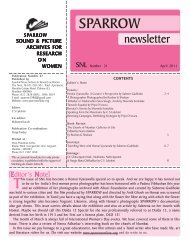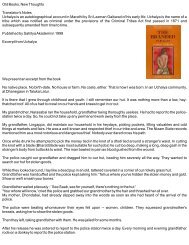SNL25-26_final for print.pmd - sparrow
SNL25-26_final for print.pmd - sparrow
SNL25-26_final for print.pmd - sparrow
- No tags were found...
You also want an ePaper? Increase the reach of your titles
YUMPU automatically turns print PDFs into web optimized ePapers that Google loves.
Book ReviewMalayalam Dalit WritingEdited by: M Dasan,ProfileoV Pratibha, PradeepanPampriikunnu and C SChandrikaPublisher: Ox<strong>for</strong>d University PressNumber of Pages: 322Price: Rs. 595/-The Ox<strong>for</strong>d India Anthology of Malayalam Dalit Writingpresents the works of writers from the early twentiethcentury to recent times, covering a period of over 100years. The volume contains 55 selections of poetry, fiction, plays,archival prose and critical works by 36 Dalit writers and is editedby M Dasan, V Pratibha, Pradeepan Pampirikunnu andC S Chandrika.Malyalam Dalit literature draws its energy from engaging withanti-caste sentiments. Mainstream critics and reviewers, unable tounderstand or accept the truth of Dalit experiences and perspectives,often label their writings as ‘bitter’, ‘biased’, ‘militant’, ‘angry’,and tend to exclude them from ‘serious literary’ writing. MostIndian publishers get influenced by these views, resulting in therestriction of publication to Dalit writing. This anthology has givenan opportunity to these long silenced and neglected voices fromthe fringes of Kerala society to be heard.The poetic tradition of Kerala Dalits has its origin in the oralculture. Be<strong>for</strong>e they began to write down their poetry, they used torefer to their oral renderings as paattu, meaning ‘song.’ Thesesongs were composed around three main themes: their daily labour,history and news (sung by professional singers), and ritualisticpractices.There was a sharp turn from these traditions in the works ofPoikayil Yohannan. His songs were more individualistic, and directlyaddressed caste issues. He laments—About my race…I see no alphabetabout my race….The story of howa people who lived from times long agoin Keralamcame to be lowly on earth….The rest of the poets in the anthology differ widely in theircraftsmanship and ideological stands. The poet Raghavan Atholiwrites in a manner of the possessed ritualistic per<strong>for</strong>mer—Somebody cleans up the bloodon the claws of the vultures2.0that fall uponthe half-burnt corpses….Children serve a banquet of justiceand go to their hungry death on the streets. (‘Justice Cooked’)Dried up river and elusive tideMenstruating goatsRivers that never wash away the pollution…. (‘Where Hunger isSold’)Some of the poets, on the other hand, experiment with looseprosaic <strong>for</strong>ms. They put on a seemingly detached note even whenit is packed with emotion:On the hillslope we had a lot of land….Once returning from school,Grandmother saidChild, you needn’t go back there…On what Achachan lost <strong>for</strong> a bottle of toddy….Many days later….I lost my ammamma ….… I found she’d left the vegetables and fishOn the banks and was down in the stream washing her face.Not because she felt like weeping. ( S Kalesh ‘Not Because SheFelt Like Weeping)Though short fiction was produced in Kerala around mid-19 thcentury, Dalit short fiction emerged in the 20 th century, in theperiod known as the ‘Kerala Renaissance.’ A characteristic of thisperiod was zeal <strong>for</strong> social re<strong>for</strong>mation. TKC Vaduthala’s ‘Sweetofferingat Chankranthy’ included in this volume reflects this. Focuson class exploitation is another characteristic of this period. PaulChirakkarode focuses on Dalit conversion to Christianity and itsrelated problems, represented here by the story ‘Nostalgia.’ CAyyappan, while exploring the Dalit identity, blends a unique craftand sharp intellect. He deals with the issue of Dalit elitism in theintriguing story ‘Madness.’The novel in Malayalam, first published in 1878, focussed onan explication and analysis of day-to-day life in Kerala right fromthe beginning. The excerpts from novels presented in this collectionalso follow the same trend. Excerpts from When Shackles Break byTKC Vaduthala and The Pulaya Ghetto by Paul Chirakkarodechallenge the Pulayas to stand up <strong>for</strong> themselves in order to improvetheir status and living conditions. But in The Festival at MuthanKavu, D Rajan affirms the traditional practices of Parayas.In the drama section, A Santhakumar’s Dreamhunt, a surrealtragic play is presented. And the Life Writings section containsexcerpts from biographical and autobiographical writings.Mangrove planter Kallen Pokkudan’s ‘My Life’ throws light on hisstruggles and the attitudes of people in the society.While the book offers interesting and moving reading, the Englishlanguage of some of the pieces is quite bad, hindering enjoyment.Barring that, this anthology is definitely worth a perusal.—Malsawmi Jacob




